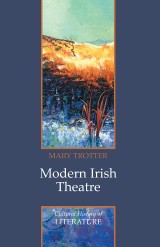Details

Modern Irish Theatre
Cultural History of Literature 1. Aufl.
|
18,99 € |
|
| Verlag: | Wiley |
| Format: | EPUB |
| Veröffentl.: | 08.05.2013 |
| ISBN/EAN: | 9780745654478 |
| Sprache: | englisch |
| Anzahl Seiten: | 248 |
DRM-geschütztes eBook, Sie benötigen z.B. Adobe Digital Editions und eine Adobe ID zum Lesen.
Beschreibungen
Analysing major Irish dramas and the artists and companies that performed them, <i>Modern Irish Theatre</i> provides an engaging and accessible introduction to twentieth-century Irish theatre: its origins, dominant themes, relationship to politics and culture, and influence on theatre movements around the world. By looking at her subject as a performance rather than a literary phenomenon, Trotter captures how Irish theatre has actively reflected and shaped debates about Irish culture and identity among audiences, artists, and critics for over a century. <p>This text provides the reader with discussion and analysis of:</p> <ul> <li>Significant playwrights and companies, from Lady Gregory to Brendan Behan to Marina Carr, and from the Abbey Theatre to the Lyric Theatre to Field Day;</li> <li>Major historical events, including the war for Independence, the Troubles, and the social effects of the Celtic Tiger economy;</li> <li>Critical Methodologies: how postcolonial, diaspora, performance, gender, and cultural theories, among others, shed light on Irish theatre’s political and artistic significance, and how it has addressed specific national concerns.</li> </ul> <p>Because of its comprehensiveness and originality, <i>Modern Irish Theatre</i> will be of great interest to students and general readers interested in theatre studies, cultural studies, Irish studies, and political performance.</p>
<p>Acknowledgements vii</p> <p>Timeline of Signifi cant Events in Irish Arts and Politics ix</p> <p>Introduction 1</p> <p><b>Part I: Performing the Nation, 1891-1916 5</b></p> <p>Introduction to Part I 7</p> <p>1 Imagining an Aesthetic: Modern Irish Theatre’s First Years 13</p> <p>2 Realisms and Regionalisms 35</p> <p><b>Part II: War and After, 1916-1948 61</b></p> <p>Introduction to Part II 63</p> <p>3 The Abbey Becomes Institution: 1916-1929 67</p> <p>4 New Voices of the 1930s and 1940s 91</p> <p><b>Part III: Rewriting Tradition, 1948-1980 113</b></p> <p>Introduction to Part III 115</p> <p>5 Irish Theatre in the 1950s 119</p> <p>6 Irish Theatre's Second Wave 136</p> <p><b>Part IV: Re-imagining Ireland, 1980-2007 151</b></p> <p>Introduction to Part IV 153</p> <p>7 Theatres Without Borders: Irish Theatre in the 1980s 157</p> <p>8 A New Sense of Place: Irish Theatre since the 1990s 176</p> <p>Conclusion: What is an Irish Play? 195</p> <p>Notes 199</p> <p>Bibliography 210</p> <p>Index 224</p>
“Mary Trotter’s <i>Modern Irish Theatre</i> will find a permanent residence on the reading lists for every course I teach on modern and contemporary drama. Her expertise is vast and deep, and this book makes a fine, unique contribution to our knowledge of the ‘infinite variety’ of Irish drama.”<br /> <b>Stephen Watt, <i>Indiana University</i></b><br /> <p><br /> </p> <p>“Through a set of superbly constructed phases Mary Trotter situates twentieth-century Irish theatre in its evolving socio-political contexts. She covers theatrical activities from Belfast to Cork and from Dublin to Galway, analysing along the way a vast array of texts and performances from the high modernism of the early Abbey through to the community theatre of Charabanc. In a highly accessible style she articulates superbly how Irish theatre has performed the nation, how its use of realism can be read as counter-hegemonic, and how representations of gender and race have disrupted the myth of the rural in the theatrical imaginary.”<br /> <b>Brian Singleton, <i>Trinity College, Dublin</i></b></p>
<b>Mary Trotter</b> is Associate Professor of Theatre and Drama at the University of Wisconsin-Madison.
Analysing major Irish dramas and the artists and companies that performed them, <i>Modern Irish Theatre</i> provides an engaging and accessible introduction to twentieth-century Irish theatre: its origins, dominant themes, relationship to politics and culture, and influence on theatre movements around the world. By looking at her subject as a performance rather than a literary phenomenon, Trotter captures how Irish theatre has actively reflected and shaped debates about Irish culture and identity among audiences, artists, and critics for over a century. <p>This text provides the reader with discussion and analysis of:</p> <ul> <li>Significant playwrights and companies, from Lady Gregory to Brendan Behan to Marina Carr, and from the Abbey Theatre to the Lyric Theatre to Field Day;</li> <li>Major historical events, including the war for Independence, the Troubles, and the social effects of the Celtic Tiger economy;</li> <li>Critical Methodologies: how postcolonial, diaspora, performance, gender, and cultural theories, among others, shed light on Irish theatre’s political and artistic significance, and how it has addressed specific national concerns.</li> </ul> <p>Because of its comprehensiveness and originality, <i>Modern Irish Theatre</i> will be of great interest to students and general readers interested in theatre studies, cultural studies, Irish studies, and political performance.</p>

















